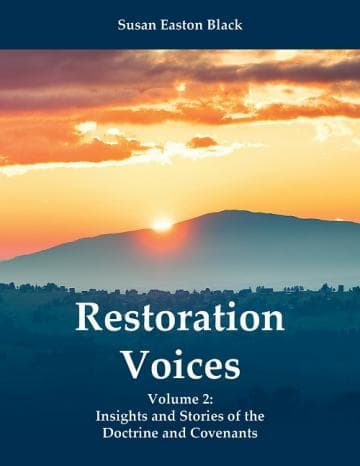Book
140 Chapters

In the evening of January 21, 1836, in the upper floor of the Kirtland Temple, the Prophet Joseph Smith said, “The power of the Highest rested upon us, the house was filled with the glory of God.”[1] Joseph saw “the celestial kingdom of God, and the glory thereof” and “the blazing throne of God, whereon was seated the Father and the Son” (D&C 137:1, 3). He saw Adam and Abraham and many noble and great ones, including his deceased brother Alvin.
Of those he saw in vision of the celestial kingdom, the Prophet Joseph “marveled how it was that [Alvin] had obtained an inheritance in that kingdom, seeing that he had departed this life before the Lord had set his hand to gather Israel the second time, and had not been baptized for the remission of sins” (D&C 137:6). The voice of the Lord spoke to His prophet saying, “All who have died who would have received it if they had been permitted to tarry, shall be heirs of the celestial kingdom of God” (v. 7).
What the Prophet Joseph Smith learned on the eve of January 21, 1836, was the glorious doctrine of salvation for the dead. Key to understanding this doctrine is the principle of vicarious service, meaning that one acts in the stead of another. The supreme example of vicarious service is the atonement of Jesus Christ. Just as the Savior Jesus Christ performed a labor for us that we could not perform for ourselves, Latter-day Saints perform sacred ordinances in holy temples for those who have died, allowing them, if they choose, to become heirs of salvation.
Joseph Smith wrote of the importance of vicarious work for the dead:
The great Jehovah contemplated the whole of the events connected with the earth, pertaining to the plan of salvation, before it rolled into existence, or ever the “morning stars sung together for joy,” the past, the present and the future, were, and are with him one eternal now; he knew of the fall of Adam, the iniquities of the antediluvians, of the depth of iniquity that would be connected with the human family; their weakness and strength, their power and glory, apostasies, their crimes, their righteousness, and iniquity; he comprehended the fall of man, and their redemption; he knew the plan of salvation, and pointed it out; he was acquainted with the situation of all nations; and with their destiny; he ordered all things according to the council of his own will, he knows the situation of both the living, and the dead, and has made ample provision for their redemption, according to their several circumstances, and the laws of the kingdom of God, whether in this world, or in the world to come. ...
When speaking about the blessings pertaining to the gospel, and the consequences connected with disobedience to its requirements, we are frequently asked the question, what has become of our Fathers? will they all be damned for not obeying the gospel, when they never heard it? Certainly not. But they will possess the same privilege that we here enjoy, through the medium of the everlasting priesthood, which not only administers on earth but in heaven. ...
And now as the great purposes of God are hastening to their accomplishment and the things spoken of in the prophets are fulfilling, as the kingdom of God is established on the earth, and the ancient order of things restored, the Lord has manifested to us this duty and privilege, and we are commanded to be baptized for our dead.[2]
At the April 1976 general conference, Latter-day Saints voted by common consent to accept Joseph Smith’s vision of the celestial kingdom as scripture. An account of that vision was subsequently published in the Pearl of Great Price. In June 1979 the First Presidency of the Church announced that Joseph’s vision would become Doctrine and Covenants, section 137.[3]
Book
140 Chapters
Items in the BMC Archive are made publicly available for non-commercial, private use. Inclusion within the BMC Archive does not imply endorsement. Items do not represent the official views of The Church of Jesus Christ of Latter-day Saints or of Book of Mormon Central.